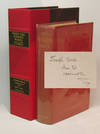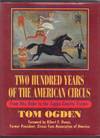
Six Weeks at Long's by a late resident.
by [BARRETT, Eaton Stannard, attributed to]
- Used
- Hardcover
- first
- Condition
- See description
- Seller
-
Sheffield, Massachusetts, United States
Payment Methods Accepted
About This Item
"NOBLE PROFLIGATES AND HONOURABLE DUPES" THOMAS JEFFERSON (PRESUMABLY) HAD A CHANCE TO BUY THIS COPY FOR THE UNIVERSITY OF VIRGINIA FROM AN IMPORTANT MARYLANDER/VIRGINIAN, AND TURNED THE OFFER DOWN: A PARODY OF LORD BYRON (AN ACQUAINTANCE OF THE AUTHOR), SHELLEY, THOMAS MOORE, LADY CAROLINE LAMB, ET AL
A FINE AMERICAN ASSOCIATION COPY WITH MORE THAN 50 PSEUDONYMOUS CHARACTERS IDENTIFIED IN MANUSCRIPT
[BARRETT, Eaton Stannard, attributed to]. [JERDAN, William, who claimed some part in the authorship, and Michael NUGENT]. [SOMERVILLE, William Clarke, provenance]. Six Weeks at Long's by a late resident. 3 vols., 12mo, contemporary (American?) calf, red leather lettering pieces, spines gilt with simple gilt rules, edges gilt scored (vol. I hinges cracked, but firm; vol. II slightly cracked; extremities little rubbed), 1 p.l., pp. xii, 235; 1 p.l., pp. 230; 1 p.l. pp. 226, [2] terminal ads. London: Printed for the Author [by B. Clarke, Printer, Well Street, London], 1817.
First Edition. Without half-titles, as is common with known copies. A now scarce novel, popular enough at the time to demand three editions the same year, a novel in which Lord Byron, who became an acquaintance of the author, appears as "Lord Leander," and Percy Shelley as "Periwinkle." Ownership signature on title-page of each volume of a prominent Maryland-born Virginian: "Wm S. Somerville/ Long's Hotel/ London/ Feb. 22nd 1818," inscribed while a guest at the very hotel featured as the novel's title. The inscriptions are uniformly scored through by a single line, which leaves them entirely legible. Somerville stayed at Long's Hotel, a long-lived establishment in London's Bond Street, a fashionable gathering place, destination water hole, and lodging house for London society and like visitors. Byron, who appears here, was last at Long's in 1815, when he was entertained by Sir Walter Scott. Tipped inside front cover is a manuscript list (with two celotape repairs at bottom) of 47 pseudonymous characters in the novel along side the names of their real-life counterparts, and one who is "fictitious." Free half of rear end paper of volume II has 17 more names, some duplicated. There are some similar pencil annotations in the text.
William Clarke Somerville (1790-1826) was born in Maryland and moved to Richmond, Virginia, as a 16-year-old minor. The independently wealthy Somerville graduated from the College of William & Mary in 1809, and later resided in Virginia as owner of Stratford Hall (open to the public to this day), having purchased the plantation, the birthplace of Robert E. Lee, from his friend and college schoolmate Henry Lee. He was a major in the army during the War of 1812, serving as far south as Louisiana, where he became friends with Edward Livingston. He subsequently served as Lt. Colonel in the Venezuelan army in 1820 during which time he contracted the malaria that would eventually kill him.
Somerville departed from New York for a grand tour, December 3, 1817, and arrived in Ireland by January 2, 1818. Six weeks later he had acquired this novel. Somerville was an author and historian in his own right, writing Letters from Paris on the Cause and Consequences of the French Revolution, Baltimore, 1822, also Essays by a Citizen of Virginia, as well as poetry and a work on presidential elections.
"In 1825 Somerville offered to sell his library, many of which were Lee books that were sold with the estate, to Thomas Jefferson along with the freestanding bookcases that contained the library. He described the Stratford library "of three or four thousand volumes...generally of the best London and Paris Editions, in folio, Quarto & Octavo--many of them old and rare works and they form altogether the best private library I have seen in this country.' Jefferson declined the offer, replying that funds for the university had not yet been appropriated."-Stratford Hall online. Jefferson continued, saying that when funds were made available it would be up to the university's board of visitors to determine how they would be spent. We assume this novel was part of that library, a library apparently dispersed after the death of Somerville, a bachelor without issue. Extant volumes from his library are apparently rare, and we have not located any others. His 59 page manuscript journal of an 1817 trip from Baltimore to Saratoga, NY, is at the College of William & Mary. His letterbook is at Stratford Hall.
On September 7, 1825, Somerville received from President Adams a commission as political and commercial agent to Greece. He traveled by way of France with Lafayette as shipmate, with whom he became good friends, but he never reached Greece, dying in France, aged 35. Upon his death his body was taken to Lafayette's estate at La Grange, and the great man bought a cemetery for Somerville's place of burial.
Generally attributed to Barrett, the equally short-lived Irish poet, novelist and satirist (1786-1820), but claimed by Scottish antiquary and journalist William Jerdan (1782-1869) in his Autobiography
(1852), vol. II, p. 176: "At this period the satirical novel called 'Six Weeks at Long's,' in the doing of which, as formerly stated, I had a hand with Michael Nugent (a few years before a fellow reporter with me, and a clever fellow to boot...) was published. The matériel
was furnished by a military officer, I think, who paid us for our literary assistance...our production was be praised in the 'Literary Gazette,' No. 5, as a caustic portraiture of 'noble profligates and honourable dupes,' from which I now infer how it was a personal satire of an order never tolerated by me as a critic, in which Byron, Beau Brummell, Lord Yarmouth (afterwards Hertford), and other living notorieties, were pilloried. I am afraid I had little excuse at the time, except such as the starved apothecary offered to Romeo when he sold him the poison--'My poverty but not my will consents.'" "Satirical novels like Six Weeks at Long's prepared the way for popular novels of fashionable life that appeared from 1825 onwards."-The Oxford Handbook of the Eighteenth-Century Novel (note 22), p. 577. "Six Weeks at Long's may be described a a sort of portrait gallery of London society. The scene is Long's Hotel in Bond Street, and the characters include thinly disguised portraits of Lord Byron as Lord Leander (in allusion to his feat of swimming the Hellespont), Thomas Moore...and Beau Brummell...to name but a few. The most astonishing character from our point of view, however, is 'Mr. Periwinkle', the atheist, who brought up an ape in the country, with the idea of making it speak and act as a human creature...But the really astonishing thing about Mr. Periwinkle is that he turns out to be a hitherto unrecognized but nevertheless unmistakable caricature of Percy Bysshe Shelley..."-Nicholas A. Jaukosky, Peacock's Sir Oran Haut-ton: Byron's Bear of Shelley's Ape? from Keats-Shelley Journal XXIX (1980). With 1906 ownership signature in each volume of one "A. Trehearne," a name we have encountered in other books of the same period. Summers, Gothic Bibliography, p. 506. Wolff 319. NCBEL,
III-709. Garside III, p. 441. Loeber, Irish Fiction (2nd edition only in Loeber Collection at Notre Dame), ABAA-VFB
Reviews
(Log in or Create an Account first!)
Details
- Bookseller
- Howard S. Mott, Inc
(US)
- Bookseller's Inventory #
- 45
- Title
- Six Weeks at Long's by a late resident.
- Author
- [BARRETT, Eaton Stannard, attributed to]
- Book Condition
- Used
- Quantity Available
- 1
- Edition
- First Edition
- Binding
- Hardcover
- Publisher
- Printed for the Author by B. Clarke
- Place of Publication
- London
- Date Published
- 1817
- Pages
- 691
- Size
- 12mo
- Weight
- 0.00 lbs
- Keywords
- Three-Decker Novel
Terms of Sale
Howard S. Mott, Inc
About the Seller
Howard S. Mott, Inc
About Howard S. Mott, Inc
Glossary
Some terminology that may be used in this description includes:
- Gilt
- The decorative application of gold or gold coloring to a portion of a book on the spine, edges of the text block, or an inlay in...
- Edges
- The collective of the top, fore and bottom edges of the text block of the book, being that part of the edges of the pages of a...
- Folio
- A folio usually indicates a large book size of 15" in height or larger when used in the context of a book description. Further,...
- Fine
- A book in fine condition exhibits no flaws. A fine condition book closely approaches As New condition, but may lack the...
- Association Copy
- An association copy is a copy of a book which has been signed and inscribed by the author for a personal friend, colleague, or...
- Quarto
- The term quarto is used to describe a page or book size. A printed sheet is made with four pages of text on each side, and the...
- Calf
- Calf or calf hide is a common form of leather binding. Calf binding is naturally a light brown but there are ways to treat the...
- Inscribed
- When a book is described as being inscribed, it indicates that a short note written by the author or a previous owner has been...
- Leaves
- Very generally, "leaves" refers to the pages of a book, as in the common phrase, "loose-leaf pages." A leaf is a single sheet...
- New
- A new book is a book previously not circulated to a buyer. Although a new book is typically free of any faults or defects, "new"...
- 12mo
- A duodecimo is a book approximately 7 by 4.5 inches in size, or similar in size to a contemporary mass market paperback. Also...
- Cracked
- In reference to a hinge or a book's binding, means that the glue which holds the opposing leaves has allowed them to separate,...





